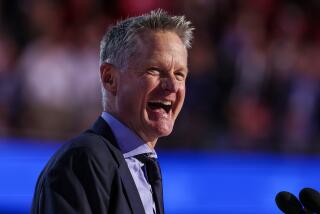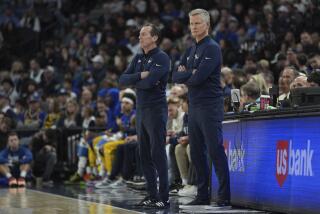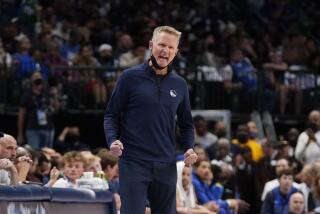Dr. Robert Kerr; Center of Controversy Over Steroids for Athletes
- Share via
Dr. Robert Kerr, a San Gabriel sports medicine specialist known worldwide for his expertise in performance enhancing drugs, has died.
Kerr died of a heart attack Wednesday at San Gabriel Valley Medical Center in San Gabriel. He was 65.
Kerr, who had diabetes, had been ill for about six weeks but seemed to be improving before this week, his oldest son, Robert, said Thursday.
He was at the hospital waiting to have X-rays taken of his chest and stomach when he suffered the fatal heart attack, his son added.
Kerr, once known as the “steroid guru,” was a controversial figure at the height of his fame in the 1980s, when he openly talked about the steroid programs he administered for athletes.
In his 1982 book “The Practical Use of Anabolic Steroids With Athletes,” Kerr wrote that he had treated more than 4,000 athletes from 20 countries.
Most of the athletes, he told the Canadian government’s 1989 commission of inquiry into drug use by athletes, were power lifters and bodybuilders, but athletes in baseball, football, ice hockey, roller hockey, track and field, cycling and swimming also were represented.
He told the commission, which was formed after sprinter Ben Johnson tested positive for steroids at the 1988 Olympics, that he provided anabolic steroids for about 20 athletes who won medals in the 1984 Olympics in Los Angeles.
He never identified the athletes to whom he had given drugs, however.
Kerr, who frequented weightlifting gyms as part of his training as an amateur rugby player, said that he began prescribing drugs for athletes in 1966 because he was appalled to see them buying drugs from the black market.
“That seemed to me a rather bizarre way to take medications,” he said. “I thought medical doctors should try to put some sense into what was going on.”
Asked about the ethics of helping athletes cheat--steroids are banned by the International Olympic Committee, among several other sports governing bodies--Kerr told “60 Minutes” in a 1985 interview: “This is not cheating--not when everyone does it.”
“Olympic officials feel no one should take the drugs,” he told the Washington Post. “That’s fine, but that isn’t the way it is. There should be no famine, no war and people shouldn’t shoot our planes out of the sky. But that’s just the way it is.”
But Kerr said he eventually stopped prescribing steroids to athletes.
“I used to think that, because so many were taking black market anabolic steroids, . . . if the physician gave a little guidance and said to them that a little will give them the gains they want without taking the other things, it would be better,” he said in a 1986 interview. “But they take what I prescribe and supplement it with five or six other things. I’ve changed my mind. You can’t trust athletes.”
In 1987, California made it illegal to prescribe steroids and other drugs solely for strength building.
Born in Cincinnati, Kerr grew up in Ohio and California, earning his undergraduate degree from University of Redlands and his medical degree at UC Irvine. He practiced medicine in the San Gabriel Valley for 35 years, serving as the team doctor at San Gabriel High for 30 years and at Bell Gardens High for the last three. In later years, he limited his practice to general medicine and minor sports injuries.
Kerr is also survived by his second wife, Barbara Ruth Kerr; son David Austin Kerr; daughter Laura Jean Lawrence; stepsons Ron and Chris Gaskill; and eight grandchildren.
A memorial service is scheduled for Jan. 13 at 11 a.m. at Church of Our Savior, 543 W. Roses Road, San Gabriel.
More to Read
Go beyond the scoreboard
Get the latest on L.A.'s teams in the daily Sports Report newsletter.
You may occasionally receive promotional content from the Los Angeles Times.






